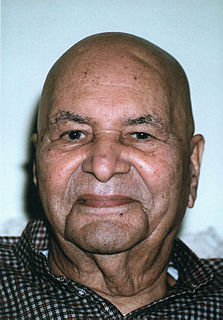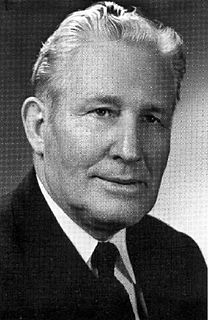A Quote by Dalai Lama
From the viewpoint of absolute truth, what we feel and experience in our ordinary daily life is all delusion. Of all the various delusions, the sense of discrimination between oneself and others is the worst form, as it creates nothing but unpleasantness for both sides. If we can realize and meditate on ultimate truth, it will cleanse our impurities of mind and thus eradicate the sense of discrimination. This will help to create true love for one another. The search for ultimate truth is, therefore, vitally important.
Quote Topics
Absolute
Absolute Truth
Another
Between
Both
Both Sides
Cleanse
Create
Creates
Daily
Daily Life
Delusion
Delusions
Discrimination
Eradicate
Experience
Feel
Form
Help
Important
Life
Life Is
Life Is A
Love
Meditate
Mind
Nothing
Oneself
Ordinary
Others
Our
Realize
Search
Sense
Sides
Therefore
Thus
True
True Love
Truth
Truth Is
Ultimate
Ultimate Truth
Various
Viewpoint
Will
Worst
Related Quotes
All mass movements strive, therefore, to interpose a fact-proof screen between the faithful and the realities of the world. They do this by claiming that the ultimate and absolute truth is already embodied in their doctrine and that there is no truth nor certitude outside it. The facts on which the true believer bases his conclusions must not be derived from his experience or observation but from holy writ.
The scientific value of truth is not, however, ultimate or absolute. It rests partly on practical, partly on aesthetic interests. As our ideas are gradually brought into conformity with the facts by the painful process of selection,-for intuition runs equally into truth and into error, and can settle nothing if not controlled by experience,-we gain vastly in our command over our environment. This is the fundamental value of natural science
All that you are attached to, all that you love, all that you know, someday will be gone. Knowing this, and that the world is your mind which you create, play in, and suffer from, is known as discrimination. Discriminate between the Real and the Unreal, the known is unreal and will come and go so stay with the Unknown, the Unchanging, the Truth.
... we are obliged to produce the truth by the power that demands truth and needs it in order to function: we are constrained, we are condemned to admit the truth or to discover it. Power constantly asks questions and questions us; it constantly investigates and records; it institutionalizes the search for the truth, professionalizes it, and rewards it. ... In a different sense, we are also subject to the truth in the sense that truth lays down the law: it is the discourse of truth that decides, at least in part; it conveys and propels effects of power.
It is not given to man to know the whole Truth. His duty lies in living up to the truth as he sees it, and in doing so, to resort to the purest means, i.e., to non-violence. God alone knows absolute truth. Therefore, I have often said, Truth is God. It follows that man, a finite being, cannot know absolute truth. Nobody in this world possesses absolute truth. This is God's attribute alone. Relative truth is all we know. Therefore, we can only follow the truth as we see it. Such pursuit of truth cannot lead anyone astray.
At the very outset I have to tell you that truth is what it is. You cannot mold it, you cannot change it. It is always the same. It has been the same, it is the same, it will be the same. But to say that we know the truth and that we have the truth is really a self-deception. If you had known the absolute truth there would have been no problems and everybody would have said the same thing. There would be no discussions, no arguments, no fights and wars. But when we don't know the absolute truth then we can find out our own mental conceptions as the truth. But this mind is so limited.
Seek the truth in all fields, and in that search you will need at least three virtues: courage, zest and modesty. The ancients put that thought in the form of a prayer. They said, “From the cowardice that shrinks from new truth, from the laziness that is content with half truth, from the arrogance that thinks it has all truth – O God of truth, deliver us.
The result of a consistent and total substitution of lies for factual truth is not that the lie will now be accepted as truth, and truth be defamed as lie, but that the sense by which we take our bearings in the real world - and the category of truth versus falsehood is among the mental means to this end - is being destroyed.
I think that most of us, anyway, read these stories that we know are not "true" because we're hungry for another kind of truth: the mythic truth about human nature in general, the particular truth about those life-communities that define our own identity, and the most specific truth of all: our own self-story. Fiction, because it is not about someone who lived in the real world, always has the possibility of being about oneself. --From the Introduction








































